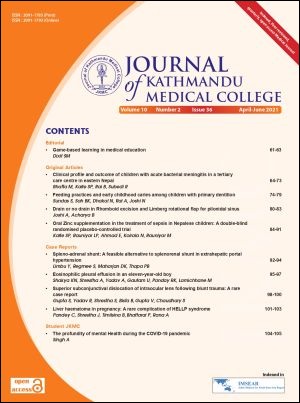Feeding practices and early childhood caries among children with primary dentition
DOI:
https://doi.org/10.3126/jkmc.v10i2.40017Keywords:
Early childhood caries, Feeding practice, Severe early childhood cariesAbstract
Background: Early childhood caries (ECC) is major oral health problem of young children. Risk factors for ECC are poor oral hygiene and feeding practices. Prevalence and severity of ECC is increasing with change in lifestyle and diet pattern in developing countries.
Objectives: To assess the association between feeding practices and severity of early childhood caries in preschool children.
Methods: An analytical cross-sectional study was conducted with convenient sample of 96 children up to six years age in Peoples Dental College from July to December 2020. Clinical examination included the recording of dental caries (dmft) using WHO criteria. The self-validated questionnaire consisting seven questions about feeding practices was asked to mothers. The Chi-square test was performed to determine association between severity of ECC and feeding pattern.
Results: Mean dmft was 6.77 ± 5.91. Prevalence of severe-ECC (S-ECC) was highest in youngest age group. Caries experience was similar in breast fed, bottle fed, and mixed. There was no significant difference in non-severe ECC and ECC in relation to duration of breast or bottle feeding but frequency of night feeding was associated with S-ECC. Children given ready-made infant formula solid food had more S-ECC (13, 92%) compared to non-severe ECC (1, 7.1%) which was statistically significant. Children given homemade gram flour food were noted to have less of S-ECC (5, 27.5%) than nonsevere ECC (13, 72.5%) which was statistically significant.
Conclusion: Present study revealed that multiple night feeding and weaning with readymade food are significant factors for S-ECC.
Downloads
Downloads
Published
How to Cite
Issue
Section
License
Copyright © Journal of Kathmandu Medical College
The ideas and opinions expressed by authors or articles summarized, quoted, or published in full text in this journal represent only the opinions of the authors and do not necessarily reflect the official policy of Journal of Kathmandu Medical College or the institute with which the author(s) is/are affiliated, unless so specified.
Authors convey all copyright ownership, including any and all rights incidental thereto, exclusively to JKMC, in the event that such work is published by JKMC. JKMC shall own the work, including 1) copyright; 2) the right to grant permission to republish the article in whole or in part, with or without fee; 3) the right to produce preprints or reprints and translate into languages other than English for sale or free distribution; and 4) the right to republish the work in a collection of articles in any other mechanical or electronic format.




